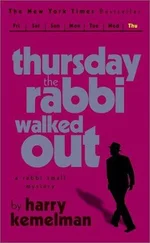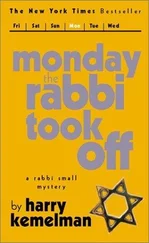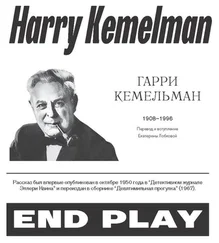"With that attitude I imagine Professor Fine is quite popular with his students." said Macomber wryly.
"I believe he is," she admitted, "and with the younger members of the faculty as well, he's quite outspoken and is regarded as concerned, that's the term they use nowadays— concerned: He was the leader in the movement to recruit black students, and even organized a tutoring service for them among the younger members of the faculty, he wrote the article in The Windrift that I showed you, if you remember."
"Oh, yes, the red-headed chap? Walks with a cane?"
"That's the one, he came at mid-years on a one-year contract, so if you decide to drop him there should be no problem with the AAUP."
"Well now," said Macomber. "let's not be hasty. Just because he has no tenure and no legal right to a hearing, doesn't mean it wouldn't cause a lot of trouble if we failed to grant him one. You yourself say he's popular with students and faculty. This is just the sort of thing that could be blown up into a student protest. I'm sure I don't have to tell you. Millicent, that's the last thing we need now with school opening in a couple of days."
"But a member of the faculty helped a student to cheat! Do you have any idea what could happen if that got out?"
"Oh, I don't think that's likely. Not if Professor Fine is approached in the proper manner. Suppose we play it this way...."
* * *
Seated in the visitor's chair. Roger Fine appeared completely at ease except for his whitened knuckles on the hand gripping his cane. "You realize. Miss Hanbury," he said, "that you have no real proof."
"Do you deny it?"
"I neither deny nor affirm it,” he said negligently. "I don't think I'm required to answer at all."
Dean Hanbury tapped her desk with her fingertips as she gathered her thoughts. Finally she said. "I have not spoken to Miss Dunlop— as yet. I feel certain that if told she must substantiate her phenomenal grade in the final by taking another exam, she will admit everything." She looked away and then added. "I understand she has a small scholarship from some religious group in Kansas where her father is a minister."
"What do you want. Dean Hanbury?"
"Well." said the dean, noting the change in tone, "we don't want a scandal, and we don't want another confrontation with the students."
"In other words, you'd like me to resign quietly."
"No."
"No?"
"Since the semester has already started." said the dean. "I suspect that some of your more concerned friends among the student body and the faculty would realize that your resignation probably had been requested and might initiate the inquiries and possible actions we're trying to avoid."
"Then what exactly are you recommending. Dean Hanbury?"
Millicent Hanbury., feeling in control now, picked up her yarn and resumed knitting. "You were hired on a one-year contract which expires at the end of this semester," she said. "We would be happy to have you fulfill your contract, but on the mutual understanding it will not be renewed."
"What's the catch?"
"No catch. Professor Fine. But to insure that you leave quietly at the end of the semester. I'm asking you to sign this paper, which is your admission that you showed the Dunlop girl an advance copy of the exam. I will put it in my safe in a sealed envelope, and that will be the end of it."
The room was silent except for the click of the knitting needles. "How do you mean the end of it?"
"Just that," she said. "We are willing to let the matter rest if you are. When you have fulfilled your contract, you will leave Windemere and the envelope will be destroyed or returned to you."
"And how about my getting another job?"
"We won't interfere in any way," she assured him.
"Let me get this straight, Miss Hanbury," he said. "If I sign that paper, you put it away and say nothing. You don't mention it if I apply for another job someplace else, and they write you for reference?"
"We will make no mention of what is in that paper, we'll handle it as a matter of form and transmit whatever ratings you've been given without comment. I believe Professor Bowdoin gave you a rating before he retired?"
"Superior."
"And your student rating?"
"Also Superior. But how about Hendryx?"
"He's only acting head of your department and so would not be asked to rate you,” she said.
"All right. Give me the paper. I'll sign." He switched his cane to his left hand and reached into his breast pocket for a pen, he glanced at the single typed paragraph and was about to sign when a thought occurred to him. "How about Miss Dunlop?"
The dean laughed shortly. "Oh, we're not greatly concerned about her. Dunlop barely passed even with that A on the final, and judging by the rest of her grades. I doubt the girl will stay the distance."
Ever since the death of his wife three years earlier, President Macomber had been a lonely man, rattling around the large President's House, ministered to by his efficient but dull housekeeper. Mrs. Childs. Outwardly he appeared to maintain an active social life, going out two or three nights a week to meetings, conferences, official dinners. Once a year he was 'at home' to the faculty, serving sherry, crackers and cheese, coffee and cake, under the supervision of Mrs. Childs and a crew from the school cafeteria, and once a year, he gave dinner to the board of trustees, a dinner served by outside caterers, much to the annoyance of the estimable Mrs. Childs who regarded it as a reflection on her.
On those evenings when he stayed home, he read the newspapers after dinner, watched TV or read a book, at ten, Mrs. Childs appeared with tea which she set down on the table beside his easy chair, wished him goodnight, and went off to her own quarters off the kitchen, he usually puttered around until the eleven o'clock newscast and then himself went to bed.
Just before the fall term Macomber's daughter Betty called from Reno to announce the glad tidings that her divorce had been granted and that she was taking the next plane out, he indulged in pleasant daydreams that now things would be different, he would now have someone to talk to at breakfast and dinner. Perhaps he might even play hockey some afternoon and sneak in a round of golf, they were both avid golfers.
She would be his official hostess, and once again he could hold those purely social parties, not connected with business, that he had missed so much since his wife's death. Of course Betty was still young, thirty-five, and after a while she would develop her own circle of friends, young people with interests different from his. But not for a while yet, she would want some peace and quiet after her unfortunate marriage.
It did not work out that way, she arrived early in the evening, her plane had been delayed on the ground and then was locked into a holding pattern for almost an hour before it could land, the gaiety in her voice when she had called him from Reno was gone; she was tired and peevish.
"That awful plane!" she exclaimed by way of greeting. "I thought I'd have time to lie down for a while, and now I barely have time to shower and change."
"You don't have to change on my account, dear." said her father. "Mrs. Childs has prepared a quiet little meal. I can't tell you how I've been looking forward to the chance to talk and catch up on things."
She was contrite. "Oh, I am sorry, dad, but I'm due at the Sorensons' for dinner, they're having a few people over. It's a kind of freedom party for me— you know, celebrating my divorce, and Gretchen said she had this fascinating man she wanted me to meet."
Nor did it change with time, he saw as little of her as when she had been married and living in the suburbs, she went out almost every night, and even when they had dinner together she always seemed rushed.
Читать дальше










